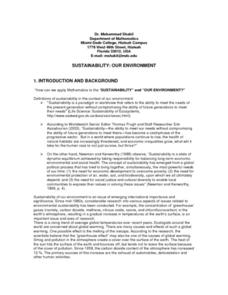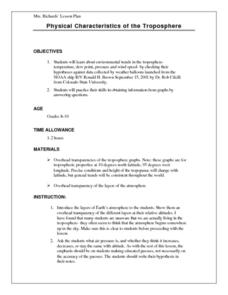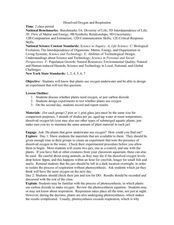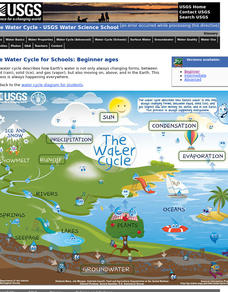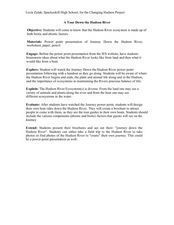Curated OER
Acid Rain
Young scholars use real-time weather maps to determine the likelihood of acid rainfall in a region. Students apply their understanding of interaction between weather systems, land and air pollution, to address acid rain and the effects...
Curated OER
Combustion Reactions
Students write a balanced chemical reaction. They articulate how burning fossil fuels increase the carbon dioxide levels in the atmosphere. Students incorporate all the environmental risks involved as well.
Curated OER
Lesson 5: Boyle's Law
Young scholars participate in a lab to verify Boyle's Law using applied force (weight) to do work on a closed isolated system of air. "Elasticity of Gases Apparatus, BASIX" from Sargent-Welch is the syringe apparatus used to measure...
Curated OER
Sustainability: Our Environment
Students explore the sustainability of our environment, the trend in rising temperatures and the emission of greenhouse cases. Using given data, students test and construct a confidence interval and the difference between two population...
Curated OER
Meteorology
Seventh graders examine the job of meteorologists. They decide which characteristics of the atmosphere that meteorologists focus on. They use local weather maps from newspapers to predict weather in their area.
Curated OER
Your Own Greenhouse
Students discuss the similarities between the Earth's atmosphere and a greenhouse. In this science lesson, students make their own greenhouses out of plastic bottles and thermometers. Students record the temperature different times of...
Curated OER
Physical Characteristics of the Troposphere
Students lexplore environmental trends in the troposphere- temperature, dew point, pressure and wind speed- by checking their hypotheses against data collected by weather balloons.
Curated OER
Heat Transfer and Pollution
Students perform computer simulations on air dispersion. In this chemistry lesson plan, students calculate energy transfer based on specific heat and temperature change. They explain the causes of smog.
Curated OER
Condensation
Middle schoolers explain how water changes from vapor to liquid with a change in temperature by engaging in this experiment. They use a worksheet imbedded in this lesson plan to guide their inquiry.
Curated OER
Physics- global warming
Students discuss the concept of global warming and view a multimedia clip on the global warming phenomenon. They statistically analyze mean temperature data and compare a given set of data. Data on atmospheric CO2 is done then they...
Curated OER
Weather Chart
Students select at least 6 cities from around the world to keep track of their high and low temperatures over a period of time.
Curated OER
Convection Currents
Students explain and understand the circulation of air in the atmosphere. They identify that energy can be carried from one place to another by heat flow or by waves, including water, light and sound waves, or by moving objects. ...
Curated OER
Winter Wonderland - Winter Olympics and the Water Cycle
After a concise introduction to the water cycle, junior meteorologists access NOAA's average snowfall data. They choose a city to examine in terms of precipitation. Then they look at historical snowfall data and use it to predict snow...
Curated OER
Does Humidity Affect Cloud Formation?
Middle schoolers use S'COOL data to identify factors that affect cloud formation. They find a data set using the S'COOL database , and use Excel to manipulate the data. Student isolate relevant data, create meaningful graphs from a...
Curated OER
Dissolved Oxygen and Respiration
Students are presented with the question, "Do plants that grow underwater use oxygen?" They create an experiment to test the presence of dissolved oxygen in the water using provided materials. Student experiments include a control jar as...
Curated OER
Tides in the Hudson
Young scholars view an illustration of the Hudson River watershed and identify the bodies of water shown. They discuss what happens when fresh and salt water mix. Students view a teacher demonstration of the stratification of fresh and...
Curated OER
Change Since 1609
Students recognize how the climate of the Hudson Valley has changed since the last glaciation. They explain these changes using a reconstruction of the land use changes in the Hudson Valley composed of confetti, Ziploc bags and other...
Curated OER
Paleoclimate of the Hudson Valley
Young scholars recognize how the climate of the Hudson Valley has changed since the last glaciation and be able to explain these changes. They reconstruct the paleoclimate of the Hudson Valley.
US Geological Survey
The Water Cycle for Schools: Beginner Ages
Explore a day in the life of a water droplet. An interactive infographic helps scholars learn how water cycles work from precipitation all the way around to condensation. Learners hover over each step of the cycle to read more as they...
Wild BC
The Greenhouse Effect: Warming the Earth Experiment
First in a two-part lesson on the greenhouse effect, this lesson involves a classroom demonstration of the phenomenon, and a lab group experiment with color and absorption. Although there are easier ways to demonstrate the greenhouse...
Curated OER
Fourth Grade Science
In this science activity, 4th graders answer multiple choice questions about natural objects, rainfall, the solar system, and more. Students complete 25 questions.
K12 Reader
Meteorologists
Meteorologists and the tools they use are the subject of a reading comprehension worksheet that asks kids to read the attached article and respond to a series of comprehension questions.
Curated OER
A Tour Down the Hudson River
Students discuss how the Hudson River is an ecosystem made up of both biotic and abiotic factors. They view the PowerPoint the Journal Down the Hudson River. Students become aware of where the Hudson River begins and ends, the plant and...
Curated OER
Is Our Water Healthy?
Students test water for a least one chemical characteristic. They hypothesize how a storm event might change the chemical characteristics of a stream. Students collect water samples and use the chemical test to test the water.





